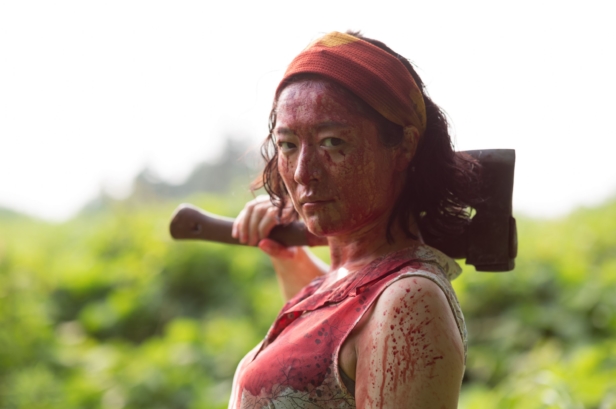In an already overcrowded market, Japan has more than its fair share of cheaply made, direly unoriginal zombie films, and Shin’ichirô Ueda’s One Cut Of The Dead (Kamera o tomeru na!) starts as yet another entirely unnecessary addition to this cluttered canon. After a woman (Yuzuki Akiyama) unconvincingly tries to fend off her boyfriend-turned-zombie with an axe before being bitten herself, the director Higurashi (Takayuki Hamatsu) suddenly intervenes, calling cut on what has been the 42nd take of the scene, and giving voice to the sense of weariness that the viewer too is probably experiencing. “Give me real fear!”, he shouts at the young actress Chinatsu (Kazuaki Nagaya), “Your life itself is utter fake.” As a 30-minute break is called, and Chinatsu and her co-star Ko (Kazuaki Nagaya) let off steam with makeup artist Nao (Harumi Syuhama), real zombies suddenly invade the factory location, causing the three to act, and a delighted Higurashi to continue filming this newly developing scenario that offers all the vérité he could ever want.
In other words, One Cut Of The Dead is a self-consuming artifact – a film-within-a-film(-within-a-film) that keeps ironising its own form, as well as confounding the boundaries between fiction and reality, performance and life. Despite Higurashi’s initial call to cut, and his complaint about having to film multiple takes, the first 35 minutes or so are, in keeping with the title, shot in a single continuous take, telling a story whose occasional incoherences and odd excursions are in part covered over by the sheer fluidity of the narrative’s momentum. After this we see the made-for-TV broadcast being commissioned, produced, and finally filmed, in a chaotic half-hour shoot where individual disgruntlements, stars’ preciousness, alcoholism, dyspepsia and a deranged overcommitment by one cast member to her rôle all force everyone in the tightly scripted show to deviate from the text and improvise freely.
“Fast, cheap but average” commercials director Higurashi, his wife and daughter must – and do – step up and give their all to keep the live show running. Here the horror itself – a scenario in which horror filmmakers get caught up in real horror akin to Diary Of The Dead, Grave Encounters or I Survived A Zombie Holocaust – comes front-loaded, and is then replaced by a hilarious mix of making-of material which gives a behind-the-scenes twist to all the visible anomalies of the TV show. For in this postmodern deconstruction of low-budget genre filmmaking, necessity really is the mother of invention, and the more haphazard and impromptu the production seems, the more sophisticated and metacinematic One Cut Of The Dead – or at least Ueda’s One Cut Of The Dead – proves to be.
One Cut Of The Dead was seen and reviewed at Fantasia 2018.
